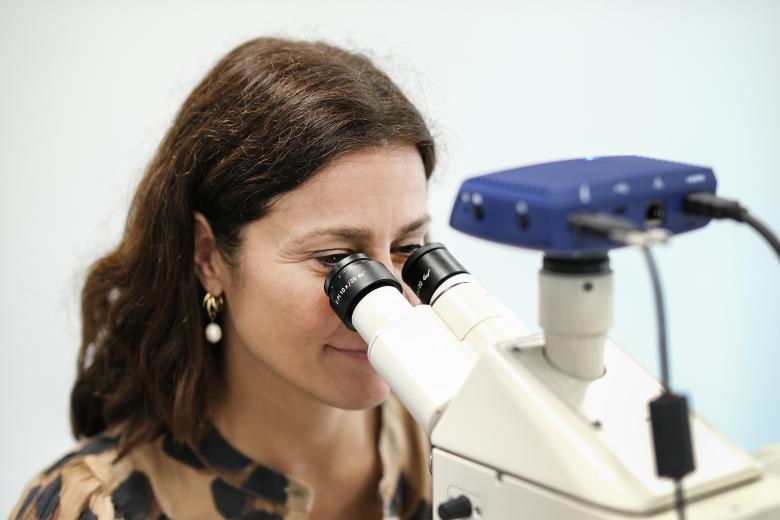Lobke Meels - turning research into marketable solutions
A bachelor’s degree in Biomedical Sciences gives you ample choice for where to apply your detailed knowledge of sickness and health. Whether you want to work in or outside of the lab. Lobke Meels is an inspiring example of pursuing a career outside of the lab. She combined her bachelor’s programme Biomedical Sciences with a master’s in health economics and management and now works on turning research into marketable medical products.
Dig deep
Hand Lobke a subject that interests her, and she’ll dig deep to learn everything about it. “I knew I wanted to work in the medical sector, and Biomedical Sciences teaches you about medicine and the human body all the way down to its molecular levels.” Lobke specialised in molecular diagnostics and worked during a gap year as a research assistant at the Pathology department of MUMC+, researching potential biomarkers for renal cell carcinoma. “I combined that with a part-time research function at a medical start-up that developed early-stage melanoma prognostic tests”.
In high demand
Since it was a start-up, Lobke also became involved in all management areas of the company: “IP, technology assessment, quality management… all these fields come together to turn research into marketable products.” To learn more, or say dig deeper, Lobke applied for a master’s in health economics and management.
The master’s programme was very popular, so I didn’t expect to be approved without a management background. It turns out health management masters welcome students with a background in biomedical sciences because the combination is in high demand on the job market nowadays.”
It turns out health management masters welcome students with a background in biomedical sciences
Automated tissue detection
After her master’s, Lobke started at Xyall, a MedTech company specialising in automated tissue dissection technology. “When tumor tissue is taken from a patient, it undergoes a series of steps until final diagnosis. Those steps are performed manually by pathologists, technicians and molecular diagnostics. This process is labour-intensive, time-consuming, and prone to error and contamination. Our company, Xyall, developed a solution to digitise and automate the tissue dissection workflow to help pathologists obtain more reliable molecular diagnostic test results.The technology combines a high degree of precision and reproducibility into a fully integrated solution, allowing for the accurate and efficient selection of samples for molecular analysis.
Management from a lab technician’s perspective
Lobke combines biomedical knowledge with economics as a product manager, to ensure Xyall’s products meet the customer’s requirements. “I’m involved in the roadmap of our automation devices, to continue positioning it on the medical market. We are now focusing on research facilities in the USA, but our goal is to implement it clinically so individual patients can be diagnosed with an accurate automated system. I have the advantage of knowing what it’s like to work in a lab and what the needs of lab technicians are.”
I have the advantage of knowing what it’s like to work in a lab and what the needs of lab technicians are
Also read
-
Fresh air
Newly appointed professor Judith Sluimer (CARIM) talks about oxygen in heart functioning and the 'fresh air' the academic world needs.

-
Dutch Research Council rewards three Maastricht research proposals
The Dutch Research Council (NOW) has decided that within the so-called ENW Open competition XS research programme, 28 projects will receive funding. Three of those projects are headed by a UM scientist.

-
Interprofessional education in healthcare
Sound interprofessional collaboration leads to better-perceived care, better healthcare outcomes, and sustainable employability of healthcare professionals. As a catalyst for improved healthcare, students need to prepare for interprofessional collaboration.
